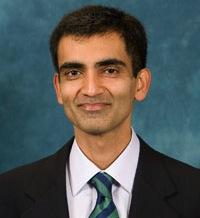ME Seminar on "A continuum treatment of solid state phase transformations driven by non-convex free energies in strain and composition."
Events | Mechanical Engineering
ME Seminar on "A continuum treatment of solid state phase transformations driven by non-convex free energies in strain and composition."
November 24, 2014 7:30 AM

Speaker
Krishna Garikipati, Mechanical Engineering & Mathematics, University of Michigan
Location
ESB 1001
Type
Seminar
Abstract: We consider the continuum formulation and numerical solution of mechano-chemically driven phase transformation problems that are characterized by a free energy function that is non- convex with respect to strain and composition. The non-convexity demands that at least the first gradients of strain and composition be included in the formulation to ensure mathematical well-posedness, and physically consistent solutions. The corresponding chemical problem was famously treated by Cahn and Hilliard in 1958, although the mathematical formulation is perhaps more appropriately credited to van der Waals (1874). Toupin followed with the nonlinear, strain gradient elasticity problem in 1962. The coupled, nonlinear, initial and boundary value problem has not been solved to our knowledge, mainly because of the smoothness requirement imposed by the higher-order partial differential equation of nonlinear strain gradient elasticity. Here, we draw upon interpolation functions with a spline basis to surmount this difficulty, and also extend them to the van der Waals/Cahn-Hilliard formulation of the chemical problem. The mathematical formulation is variationally derived, and its numerical implementation is made possible by a weak treatment of higher-order boundary conditions. The use of algorithmic differentiation also makes the exact linearization tractable.
In this talk I will focus on presenting solutions to the problem of evolving microstructure. This is joint work with Shiva Rudraraju at Univ. Michigan, and Anton Van der Ven.
Bio: Krishna Garikipati is Professor of Mechanical Engineering, and of Mathematics at University of Michigan. He obtained his PhD from Stanford University in 1996, and joined the faculty at University of Michigan in 2000. His Computational Physics Group develops mathematical and numerical formulations for multiphysics problems with applications in biophysics and materials physics. In addition to his faculty appointments, he is the Associate Director for Research at the Michigan Institute for Computational Discovery and Engineering.
Host: Prof. Megan Valentine